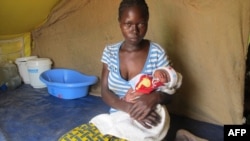GENEVA —
The UN refugee agency is urging governments around the world against forcibly returning refugees to the Central African Republic. The UNHCR warned the situation in the CAR is still too dangerous for refugees to return home safely.
The agency said the situation in the Central African Republic has worsened since rebel Seleka forces launched a series of attacks against the government of former President Francois Bozize in December.
UNHCR spokesman, Adrian Edwards, said the situation has become even more chaotic since the rebels seized the capital, Bangui, in March.
"In the wake of the offensive, targeted killings, arbitrary arrests and detention, torture and recruitment of children have been widely reported. Rape, disappearances, kidnappings, as well as extortion and looting in Bangui and other parts of the country are also reported," he said. "Humanitarian access to the people affected remains severely restricted."
For all these reasons, Edwards said the UNHCR is advising governments worldwide to refrain from forcibly deporting refugees to the CAR.
The UNHCR reports violence has displaced some 173,000 people inside the CAR and prompted almost 50,000 people to flee to neighboring countries in recent months. Most of them have fled to the Democratic Republic of Congo, Chad and Cameroon.
Edwards called the current situation in the CAR fluid and dangerous. He said the wide prevalence of human rights violations and the grave and deteriorating humanitarian situation in the country is causing untold suffering among the population.
He said states have a responsibility to see to it that asylum remains civilian in nature and that refugee status is not granted to people who may be responsible for abusive and violent acts.
"And, for this reason, we are recommending that states exert caution to identify combatants and separate them from the refugee population. The advisory also stresses that exclusion from refugee status may need to be looked into for some individuals, beyond those who are combatants," he added. "This would apply, for example, to people who may have been involved in war crimes and crimes against humanity."
The UNHCR is urging countries to protect those seeking refuge and to maintain humanitarian and asylum principles until conditions in the CAR allow people to return home in safety and dignity.
The agency said the situation in the Central African Republic has worsened since rebel Seleka forces launched a series of attacks against the government of former President Francois Bozize in December.
UNHCR spokesman, Adrian Edwards, said the situation has become even more chaotic since the rebels seized the capital, Bangui, in March.
"In the wake of the offensive, targeted killings, arbitrary arrests and detention, torture and recruitment of children have been widely reported. Rape, disappearances, kidnappings, as well as extortion and looting in Bangui and other parts of the country are also reported," he said. "Humanitarian access to the people affected remains severely restricted."
For all these reasons, Edwards said the UNHCR is advising governments worldwide to refrain from forcibly deporting refugees to the CAR.
The UNHCR reports violence has displaced some 173,000 people inside the CAR and prompted almost 50,000 people to flee to neighboring countries in recent months. Most of them have fled to the Democratic Republic of Congo, Chad and Cameroon.
Edwards called the current situation in the CAR fluid and dangerous. He said the wide prevalence of human rights violations and the grave and deteriorating humanitarian situation in the country is causing untold suffering among the population.
He said states have a responsibility to see to it that asylum remains civilian in nature and that refugee status is not granted to people who may be responsible for abusive and violent acts.
"And, for this reason, we are recommending that states exert caution to identify combatants and separate them from the refugee population. The advisory also stresses that exclusion from refugee status may need to be looked into for some individuals, beyond those who are combatants," he added. "This would apply, for example, to people who may have been involved in war crimes and crimes against humanity."
The UNHCR is urging countries to protect those seeking refuge and to maintain humanitarian and asylum principles until conditions in the CAR allow people to return home in safety and dignity.




